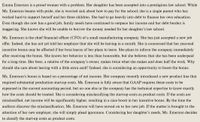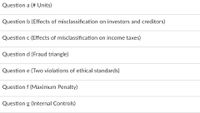
FINANCIAL ACCOUNTING
10th Edition
ISBN: 9781259964947
Author: Libby
Publisher: MCG
expand_more
expand_more
format_list_bulleted
Question

Transcribed Image Text:Emma Emerson is a proud woman with a problem. Her daughter has been accepted into a prestigious law school. While
Ms. Emerson beams with pride, she is worried sick about how to pay for the school; she is a single parent who has
worked hard to support herself and her three children. She had to go heavily into debt to finance her own education.
Even though she now has a good job, family needs have continued to outpace her income and her debt burden is
staggering. She knows she will be unable to borrow the money needed for her daughter's law school.
Ms. Emerson is the chief financial officer (CFO) of a small manufacturing company. She has just accepted a new job
offer. Indeed, she has not yet told her employer that she will be leaving in a month. She is concerned that her year-end
incentive bonus may be affected if her boss learns of her plans to leave. She plans to inform the company immediately
after receiving the bonus. She knows her behavior is less than honorable, but she believes that she has been underpaid
for a long time. Her boss, a relative of the company's owner, makes twice what she makes and does half the work. Why
should she care about leaving with a little extra cash? Indeed, she is considering an opportunity to boost the bonus.
Ms. Emerson's bonus is based on a percentage of net income. Her company recently introduced a new product line that
required substantial production start-up costs. Ms. Emerson is fully aware that GAAP requires these costs to be
expensed in the current accounting period, but no one else in the company has the technical expertise to know exactly
how the costs should be treated. She is considering misclassifying the start-up costs as product costs. If the costs are
misclassified, net income will be significantly higher, resulting in a nice boost in her incentive bonus. By the time the
auditors discover the misclassification, Ms. Emerson will have moved on to her new job. If the matter is brought to the
attention of her new employer, she will simply plead ignorance. Considering her daughter's needs, Ms. Emerson decides
to classify the start-up costs as product costs.

Transcribed Image Text:Question a (# Units)
Question b (Effects of misclassification on investors and creditors)
Question c (Effects of misclassification on income taxes)
Question d (Fraud triangle)
Question e (Two violations of ethical standards)
Question f (Maximum Penalty)
Question g (Internal Controls)
Expert Solution
This question has been solved!
Explore an expertly crafted, step-by-step solution for a thorough understanding of key concepts.
Step by stepSolved in 2 steps

Knowledge Booster
Similar questions
- Sam owns a yogurt drink van. She is buying yogurt from a supplier for £0.50 per bottle and sells for £0.60 per bottle. This is the only product Sam sells. Sam pays £100 for insurance per week and she takes a salary of £100 per week. Assume Sam has no other costs to cover. What is the contribution per unit? 0 0 0 0 A. 50p O B. 60p O C. 10p O D zeroarrow_forwardPick only one option: The owner of Tommy's Technicians has found that his shop is losing money and he is in jeopardy of going out of business. Sales have remained constant for quite some time and now he is looking at ways to cut expenses to stay in business. Which of the following expenses is his best choice to try to immediately reduce and save him meaningful dollars so he can remain in business? (Hint: First consider which ones he has ultimate control over?) Rent expense Utilities expense Payroll expense Shop insurance expense Advertising expensearrow_forward1arrow_forward
- Jordan was terminated from his employment without just cause and started looking for a new job immediately. Jordan was fuifiling his duty to: Select one O a. be productive in society. O b mitigate Oc. ad ethically Od not competearrow_forwardEe.11.arrow_forwardSelect the best answer. A cousin did not live with the taxpayer all year, but the taxpayer provided more than half of the cousin's support. The cousin was unmarried, had no income, and meets the three general dependency tests. Which is the test that disqualifies the taxpayer from claiming the cousin as a dependent? O A. Gross income O B. Joint return test O C. Member of household or relationship O D. Support Question Q4 Submit Answers 92% Complete Exit & Resume L IfwhoH-hadA&aicc url=https://hrblock.csod.com/LMS/scorm/aicc.aspxarrow_forward
- Hobby Losses (LO 3.12) Lew is a practicing CPA who decides to raise bonsai as a business. Lew engages in the activity and has the following revenue and expenses: Sales $ 5,000 Depreciation on greenhouse 10,000 Fertilizer, soil, pots 1,500 If an amount is zero, enter "0". b. If the activity is deemed to be a regular business, what is the amount of Lew's loss from the activity?$fill in the blank 9a0cfdf68fac035_1 c. If the activity is deemed to be a hobby, what is the amount of Lew's expenses (if any) from the activity that may be deducted?$fill in the blank 12b81b026feafdb_1arrow_forward(Consider This) Mason, a professional house painter, needs his tax return prepared; in which situation below would he choose to hire Madison, the CPA, rather than sacrifice time (and income) from house painting? The CPA can prepare the tax return in 2 hours and would charge $50 per hour, Mason would take 10 hours to prepare the tax return and sacrifice $15 per hour. The CPA can prepare the tax return in 10 hours and would charge $50 per hour, Mason would take 10 hours to prepare the tax return and sacrifice $15 per hour. The CPA can prepare the tax return in 2 hours and charge $100 per hour; Mason would take 10 hours to prepare the tax return and sacrifice $15 per hour. Mason would not hire Madison in any of these situations described.arrow_forwardYour spouse works part-time as a fashion designer for a clothing retailer that is an audit client. You are a covered member with respect to that client. In which circumstance, if any, would your spouse's employment at the client impair your independence? o If your spouse became a full-time employee. o If your spouse attended company events: O In any circumstance. O In no circumstance.arrow_forward
- Hello! I need help with this problem. The first one is good, but the rest are wrong. Thank you for helping me. Problem 2-21 (LO. 1) Purple Company has $200,000 in net income for 2018 before deducting any compensation or other payment to its sole owner, Kirsten. Kirsten is single and she claims the $12,000 standard deduction for 2018. Purple Company is Kirsten's only source of income. Ignoring any employment tax considerations, compute Kirsten's after-tax income for each of the following situations. Click here to access the 2018 individual tax rate schedule to use for this problem. Assume the corporate tax rate is 21%. When required, carryout intermediate tax computations to the nearest cent and then round your final tax liability to the nearest dollar. a. If Purple Company is a proprietorship and Kirsten withdraws $50,000 from the business during the year; Kirsten claims a $40,000 deduction for qualified business income ($200,000 × 20%). Kirsten's taxable income is$, and her…arrow_forwardNoah Yobs, who has $97,000 of AGI (solely from wages) before considering rental activities, has $87,300 of losses from a real estate rental activity in which he actively participates. He also actively participates in another real estate rental activity from which he has $48,500 of income. He has other passive activity income of $31,040. a. What amount of rental loss can Noah use to offset active or portfolio income in the current year? b. Compute Noah’s AGI on Form 1040 [pages 1 and 2; also complete Schedule 1 (Form 1040)] for the current year. Use the minus sign to indicate a loss. What amounts should go on lines 1, 6, & 7 on page 2 of FORM 1040? What amount s go on lines 17, & 22 on schedule one of FORM 1040?arrow_forwardCan someone please help me with this question?arrow_forward
arrow_back_ios
SEE MORE QUESTIONS
arrow_forward_ios
Recommended textbooks for you

 AccountingAccountingISBN:9781337272094Author:WARREN, Carl S., Reeve, James M., Duchac, Jonathan E.Publisher:Cengage Learning,
AccountingAccountingISBN:9781337272094Author:WARREN, Carl S., Reeve, James M., Duchac, Jonathan E.Publisher:Cengage Learning, Accounting Information SystemsAccountingISBN:9781337619202Author:Hall, James A.Publisher:Cengage Learning,
Accounting Information SystemsAccountingISBN:9781337619202Author:Hall, James A.Publisher:Cengage Learning, Horngren's Cost Accounting: A Managerial Emphasis...AccountingISBN:9780134475585Author:Srikant M. Datar, Madhav V. RajanPublisher:PEARSON
Horngren's Cost Accounting: A Managerial Emphasis...AccountingISBN:9780134475585Author:Srikant M. Datar, Madhav V. RajanPublisher:PEARSON Intermediate AccountingAccountingISBN:9781259722660Author:J. David Spiceland, Mark W. Nelson, Wayne M ThomasPublisher:McGraw-Hill Education
Intermediate AccountingAccountingISBN:9781259722660Author:J. David Spiceland, Mark W. Nelson, Wayne M ThomasPublisher:McGraw-Hill Education Financial and Managerial AccountingAccountingISBN:9781259726705Author:John J Wild, Ken W. Shaw, Barbara Chiappetta Fundamental Accounting PrinciplesPublisher:McGraw-Hill Education
Financial and Managerial AccountingAccountingISBN:9781259726705Author:John J Wild, Ken W. Shaw, Barbara Chiappetta Fundamental Accounting PrinciplesPublisher:McGraw-Hill Education


Accounting
Accounting
ISBN:9781337272094
Author:WARREN, Carl S., Reeve, James M., Duchac, Jonathan E.
Publisher:Cengage Learning,

Accounting Information Systems
Accounting
ISBN:9781337619202
Author:Hall, James A.
Publisher:Cengage Learning,

Horngren's Cost Accounting: A Managerial Emphasis...
Accounting
ISBN:9780134475585
Author:Srikant M. Datar, Madhav V. Rajan
Publisher:PEARSON

Intermediate Accounting
Accounting
ISBN:9781259722660
Author:J. David Spiceland, Mark W. Nelson, Wayne M Thomas
Publisher:McGraw-Hill Education

Financial and Managerial Accounting
Accounting
ISBN:9781259726705
Author:John J Wild, Ken W. Shaw, Barbara Chiappetta Fundamental Accounting Principles
Publisher:McGraw-Hill Education